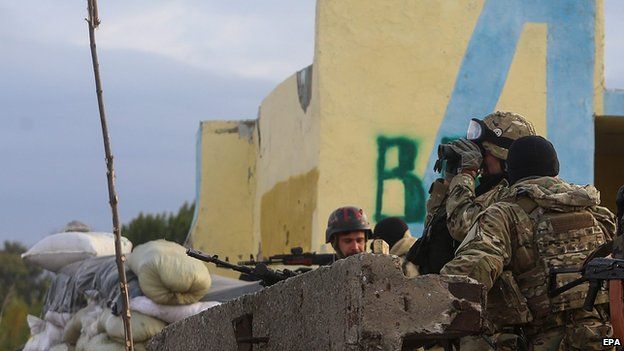'Seven Ukraine troops die' in deadliest post-truce attack
-
Published

Seven Ukrainian soldiers are said to have died in a clash with pro-Russian rebels near Donetsk airport - in what would be the deadliest single incident for the military since a truce deal.
A tank shell hit the vehicle carrying the troops, an official said.
Three civilians were reportedly killed in other incidents.
Ukrainian activists earlier toppled a statue of Lenin in the eastern city of Kharkiv - a move likely to be seen as a provocation by pro-Russians.
Nationalist protesters had gathered around the statue on Sunday night for a "Kharkiv is Ukraine" rally. The governor of Kharkiv region, Ihor Baluta, then signed an order to dismantle the statue.
The mayor of Kharkiv, Gennady Kernes, said on a local government website that the monument would be restored, calling its destruction unlawful.
Pro-Russian demonstrators defended the statue in February, as similar monuments were being taken down in other parts of the country in a wave of protests that accompanied the removal of President Viktor Yanukovych.
Kharkiv has largely escaped the violence which subsequently swept through east Ukraine's other regions, Donetsk and Luhansk.
The latest deaths cast fresh doubt on a ceasefire agreed between the Ukrainian government and the rebels on 5 September.
The seven soldiers were killed in a vehicle near Donetsk airport, which the rebels have been trying to capture from the Ukrainian military.
"During the evening attack, the Ukrainian armoured transporter, with its crew and a paratroop unit, took a direct hit from a tank," Ukrainian military spokesman Col Andriy Lysenko told reporters.
"Intensive fighting broke out. Our paratroopers sustained losses," Col Lysenko said.
He said a total of nine soldiers had been killed and 27 wounded in the past 24 hours.
Separately, authorities in Donetsk told AFP news agency that three civilians had been killed over the same period. The city is a base for the pro-Russian rebels.
The OSCE security organisation, which is monitoring the ceasefire, confirmed there had been heavy shelling around Donetsk airport.
There was also heavy shelling of the eastern outskirts of Mariupol on Friday and Saturday, OSCE spokesman Michael Bociurkiw told the BBC.
Just before the ceasefire took effect heavily armed rebels moved close to Mariupol, a strategic port city on the main route to Crimea.
Russia denies Western allegations that it has armed the rebels and sent troops into the Donetsk and Luhansk regions. About 3,200 people have died in fighting since April.
Russia annexed Ukraine's Crimea peninsula in March - a move condemned by Ukraine and the West.
The European Union and the US later imposed sanctions against Russia over its role in the Ukraine conflict.
Last week, Ukrainian President Petro Poroshenko said the "most dangerous" part of the crisis in the east had passed, predicting that his peace deal with the pro-Russian rebels would hold.
'Suspicious graves'
For several days Russian state television has reported on "mass graves" allegedly unearthed by rebels near Nizhnya Krynka, a village near Donetsk. At least four bodies have been found there, according to the Russian reports.
The television reports said Ukrainian army and national guard units had occupied the area and were suspected of shooting captives at close range.
Last week Anton Herashchenko, a Ukrainian interior ministry adviser, dismissed the mass grave allegation as "outright lies".
OSCE spokesman Bociurkiw confirmed that "about half a dozen" bodies, some of them decomposed, had been seen by OSCE monitors at the site.
"We observed unmarked graves, it was not possible to establish gender, and there were shell casings nearby," he said.
"We were not able to do a proper investigation because the OSCE doesn't have the ability to do a forensic assessment," he told the BBC.
"We had no way of establishing if they were shot or who put the weapons there."
He also said the OSCE had been unable to check whether Russia was bringing more military equipment into Ukraine or taking it out. No inspection was carried out on Russian humanitarian aid lorries that entered the conflict zone, he said.
"We don't have an inventory of what existed, so it's very difficult to establish what if anything has moved. Equipment was also unmarked," he said.